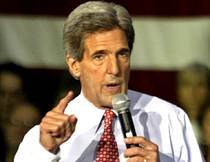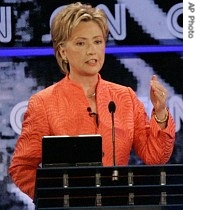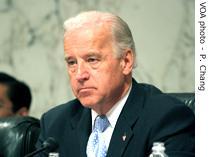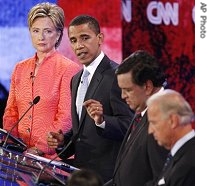2007年VOA标准英语-US Democratic Presidential Contenders Work to B(在线收听)
Washington
03 August 2007
The war in Iraq and how best to protect the U.S. from terrorist attacks promise to be major issues in the 2008 presidential election. Democratic presidential contenders in particular are trying to bolster public confidence in their ability to deal with national security threats. VOA National correspondent Jim Malone reports from Washington.
 |
| Sen. John Kerry (file photo) |
So Democrats seeking the White House in 2008 are mindful of shoring up their credentials in dealing with national security issues.
For example, Illinois Senator Barack Obama said as president he would shift U.S. military forces from Iraq to Afghanistan and would be willing to go after terrorist sanctuaries in Pakistan even without the permission of the Pakistani government.
"The first step must be to get off the wrong battlefield in Iraq and take the fight to the terrorists in Afghanistan and Pakistan," he said. "Ending the war will help isolate al-Qaida and give Iraqis the incentive and opportunity to take them out. It will also allow us to direct badly needed resources to Afghanistan."
Later in the week, Obama found himself on the defensive after he was asked by the Associated Press if he would consider using nuclear weapons to go after terrorists in Afghanistan or Pakistan.
Obama initially said it would be a profound mistake to use nuclear weapons in any circumstance in situations involving civilians. But then he quickly added that there has been no discussion of nuclear weapons, and said the issue was, in his words, not on the table.
Some of Obama's Democratic rivals quickly seized on his comments to question his foreign policy expertise.
Senator Chris Dodd of Connecticut said he found some of Obama's recent comments on foreign policy confusing and confused.
 |
| Sen. Hillary Rodham Clinton at candidate debate, 23 July 2007 |
"I think that presidents should be careful at all times in discussing the use or non-use of nuclear weapons," she said. "Presidents since the Cold War have used nuclear deterrence to keep the peace and I do not believe that any president should make any blanket statements with respect to the use or non-use of nuclear weapons."
Political experts say Obama's recent comments on foreign policy provided an opening for some of the more senior Democratic contenders with extensive foreign policy experience like Senator Dodd and Senator Joe Biden of Delaware, who chairs the Senate Foreign Relations Committee.
 |
| Sen. Joseph Biden (file photo) |
Given the importance of national security and foreign policy in next year's election, analysts say it is crucial for the Democratic presidential contenders to present themselves as capable leaders on those two issues.
In addition, Democratic political strategists believe the public's disapproval of President Bush's handling of Iraq has also eroded public confidence in the administration's ability to keep the U.S. safe from further terrorist attacks.
 |
| Democratic presidential hopefuls, Sen. Hillary Rodham Clinton, Sen. Barack Obama, New Mexico Gov. Bill Richardson; Sen. Joseph Biden, participate in a debate, 23 July 2007 |
"In this current environment, Democrats can benefit enormously by engaging Republicans, not just in the domestic argument about homeland security, such as implementing the recommendations of the 9/11 commission and secure our ports, but in a broader discussion of homeland security that includes Iraq, Afghanistan, terrorism and securing America's place in the world," she said.
Efforts by Clinton and Obama to shift the national security focus away from Iraq and back to al-Qaida are at odds with President Bush's view that Iraq remains the central front in the war on terror and the battle against al-Qaida.
"To try to shake our will they will kill innocent women and children so it gets on the TV screens so that we say, it is not worth it, let us just back off," he said.
Republican political strategists believe the Democrats are still vulnerable on the issue of national security, despite the erosion of public support for the Iraq war. They argue that a Republican candidate who is seen as strong on national security like former New York City Mayor Rudy Giuliani would be a formidable opponent in the general election against any eventual Democratic nominee, whether it is Hillary Clinton, Barack Obama or one of the other six Democratic contenders.